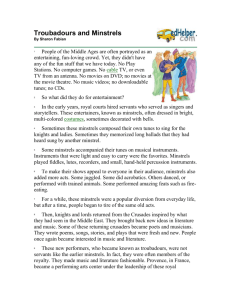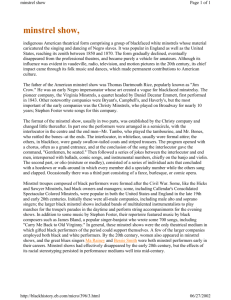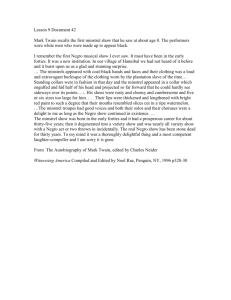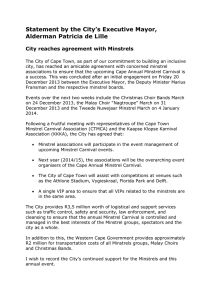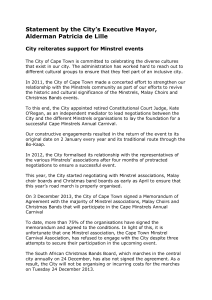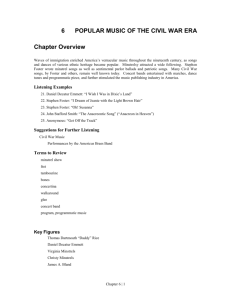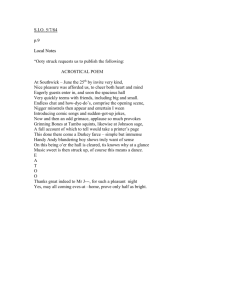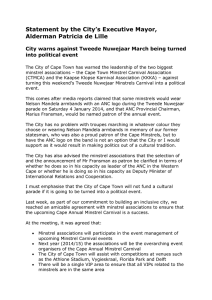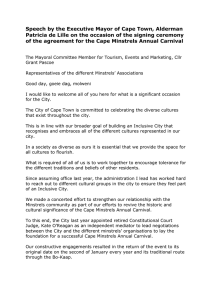Female Minstrels within the Minstrelsy Tradition and the Problems They Encounter
advertisement
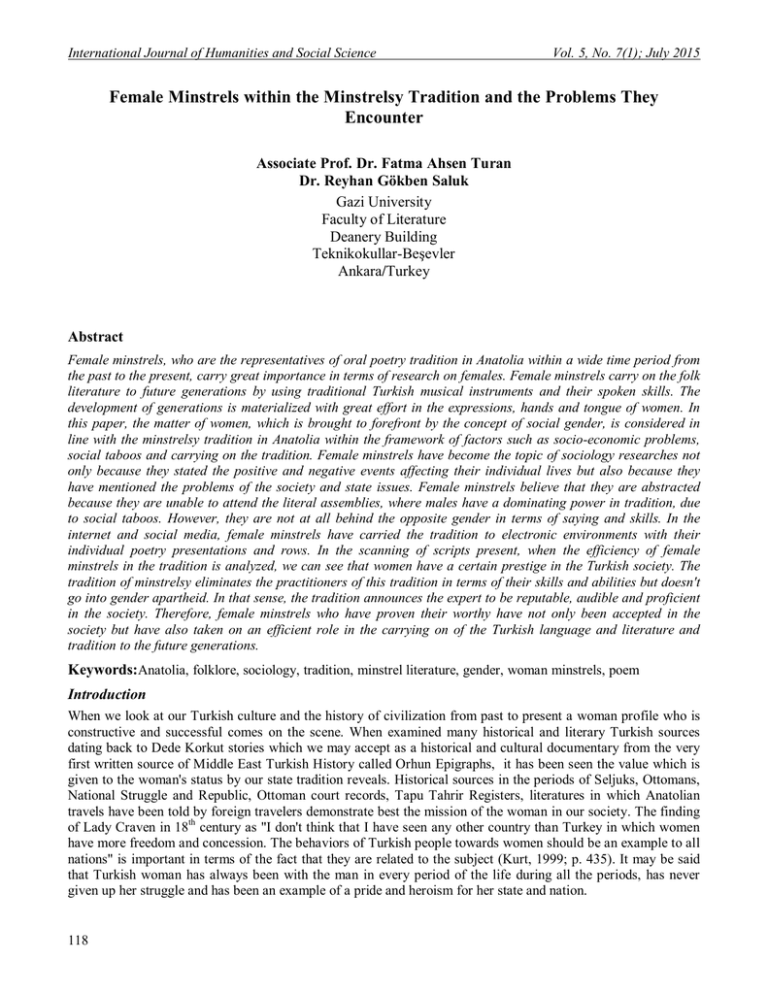
International Journal of Humanities and Social Science Vol. 5, No. 7(1); July 2015 Female Minstrels within the Minstrelsy Tradition and the Problems They Encounter Associate Prof. Dr. Fatma Ahsen Turan Dr. Reyhan Gökben Saluk Gazi University Faculty of Literature Deanery Building Teknikokullar-Beşevler Ankara/Turkey Abstract Female minstrels, who are the representatives of oral poetry tradition in Anatolia within a wide time period from the past to the present, carry great importance in terms of research on females. Female minstrels carry on the folk literature to future generations by using traditional Turkish musical instruments and their spoken skills. The development of generations is materialized with great effort in the expressions, hands and tongue of women. In this paper, the matter of women, which is brought to forefront by the concept of social gender, is considered in line with the minstrelsy tradition in Anatolia within the framework of factors such as socio-economic problems, social taboos and carrying on the tradition. Female minstrels have become the topic of sociology researches not only because they stated the positive and negative events affecting their individual lives but also because they have mentioned the problems of the society and state issues. Female minstrels believe that they are abstracted because they are unable to attend the literal assemblies, where males have a dominating power in tradition, due to social taboos. However, they are not at all behind the opposite gender in terms of saying and skills. In the internet and social media, female minstrels have carried the tradition to electronic environments with their individual poetry presentations and rows. In the scanning of scripts present, when the efficiency of female minstrels in the tradition is analyzed, we can see that women have a certain prestige in the Turkish society. The tradition of minstrelsy eliminates the practitioners of this tradition in terms of their skills and abilities but doesn't go into gender apartheid. In that sense, the tradition announces the expert to be reputable, audible and proficient in the society. Therefore, female minstrels who have proven their worthy have not only been accepted in the society but have also taken on an efficient role in the carrying on of the Turkish language and literature and tradition to the future generations. Keywords:Anatolia, folklore, sociology, tradition, minstrel literature, gender, woman minstrels, poem Introduction When we look at our Turkish culture and the history of civilization from past to present a woman profile who is constructive and successful comes on the scene. When examined many historical and literary Turkish sources dating back to Dede Korkut stories which we may accept as a historical and cultural documentary from the very first written source of Middle East Turkish History called Orhun Epigraphs, it has been seen the value which is given to the woman's status by our state tradition reveals. Historical sources in the periods of Seljuks, Ottomans, National Struggle and Republic, Ottoman court records, Tapu Tahrir Registers, literatures in which Anatolian travels have been told by foreign travelers demonstrate best the mission of the woman in our society. The finding of Lady Craven in 18th century as "I don't think that I have seen any other country than Turkey in which women have more freedom and concession. The behaviors of Turkish people towards women should be an example to all nations" is important in terms of the fact that they are related to the subject (Kurt, 1999; p. 435). It may be said that Turkish woman has always been with the man in every period of the life during all the periods, has never given up her struggle and has been an example of a pride and heroism for her state and nation. 118 ISSN 2220-8488 (Print), 2221-0989 (Online) ©Center for Promoting Ideas, USA www.ijhssnet.com The most obvious indicator of our civilization, the idea of equal individuals was put into words before Anatolia's real architects. For example: Hacı BektashVeli (the great sufi) explains gender equality and Turkish civilization's idea that there is no difference between men and women with his verses.Our women who have showed success in every field have also gained a reputation in our literature in fact with their skills in wording and speaking they have shaped our literature. In her book "Women Poets of the Ottoman Era" (2011), Müjgân Cunbur includes 39 women poets from the Ottoman Era, 9 from the Regeneration Period, 33 from Sufi Literature, 31 from Folk Literature, 52 from various magazines and writers in newspapers for women, 37 from the period connecting the Ottoman era to the Republic years. These poets were women who were one step ahead as an individual and witness of the era they lived in; as wives or daughters of members of Islamic monasteries, members or officials of the palace, these women showed they were at the side of their fathers or husbands not under their shadows. Combining these skills with their emotions, thoughts and general norms of the era they belonged to, they have become the most tender and pure representatives of poetic expression. Hilmi Yavuz states that the majority of these women poets imitated their male colleagues and wrote their poems using a male dominant language and that this situation distanced them from creating a women language style. Yavuz also expresses the opinionthat "The basis for this is because women poets had the concern of getting themselves accepted in the male dominant poetic environment." (Yavuz, 1997; p. 163, Mutlu, 2006; p. 358, Karataş, 2009; p. 1661). Of course when this situation is considered within the conditions of that time, such as the Divan Literature sphere with its strict rules, women poets not prioritizing their feminine identity needs to be taken naturally. Yavuz indicates that from these poets only Fıtnat Hanım's and Mihrî Hanım's poetry are have prominent feminine feelings and sensitivity (Yavuz, 1997; p. 163; Karataş, 2009; p.1661). Looking at Turkish Folk Literature however, we see that the first singers of the yields of anonymous folk literature such as lullabies, stories, poems and requiems are women with speech skill. In the minstrel literature sphere that is usually perceived as for men, the presence of women minstrels and hence the success women have showed in this field, the published poetry books, the minstrel celebrations they have participated in, the battle of words they had with other women and men, proves the incontrovertibly eminent presence of women in folk literature realm. The women minstrels in our eight-volume book "Sultans of Instrument and Word Living Folk Poets", which was a result of the interviews we conducted with minstrels that we have identified with studies as a team in Anatolia and Europe, is evidence that the minstrel tradition perceived as for males, actually largely consists of the works of women. Even though the material of verbal tradition has largely been transferred to written, women minstrels who have not yet been registered disables us from providing a net figure. As a result of the surveying of written resources and interviews with living minstrels, based on the data we have we have evaluated women minstrels and their problems. In consequence of our study we have identified the number of women minstrels from past to present as 210. However, we believe that it would be wrong to say this is a definite number as our study on contemporary minstrels is still continuing. When we look at women minstrels' lives we see that instruments and words are a crazy passion, a crazy love in some of their lives. Derdimend's, Şah Turna's, Şahsenem Bacı's, Mihrumah's, Sarcakız's, Mahturna's, Ezgili Kevser's, İpek Bayrak's and other women minstrels' stories of giving their heart to minstrel culture, their passions are actually very similar to each other despite them being at different places. İbrahim Aslanoğlu made these observations on his study on the illiterate woman minstrel Fatma Oflaz [Âşık Derdimed] who met Âşık Veysel in 1964 at Sivas Minstrels Festival and received his compliments: "She has devoted herself to poetry so much that when the topic comes up she lightens like a child, like an engaged girl. Especially about national issues, she turns into a courageous hero. She tries to express the feeling and excitement she is in at that moment. She said to me: 'Minstrels' words are their due. It cannot be sold with money." (Aslanoğlu, 1964; p. 42). Şah Turna known as Folk Song Mother explains her story of losing her sight at age three due to variola and her submission to instruments-words like this: "I was so in love with instruments, I mean being a blind woman is not important for me… I did not want vision… I wanted an instrument. When my father took me to the doctor I said to the doctor:'Doctor, please tell me father to get me an instrument, I don't want eyes.' The doctor understanding my love for instruments and music encouraged my father to buy me an instrument. I started playing the cura (with2-3 strings, instrument played with a pick) as soon as I picked it up as if I had been playing it for years people around me started listening to me with shock and admiration. Increasingly this interesting art flow of mine started to become a legend." (Bolçay, 2011; p. 463). This anecdote shows Şah Turna's skill in instrument and saying meaningful words in her early years and it also shows her interests and talents in music, clearly. 119 International Journal of Humanities and Social Science Vol. 5, No. 7(1); July 2015 Şah Turna explains this interest and talents with these words: "I was so in love with music that I would make a radio from mud, put the bees in the radio I made and then try to catch melodies from the bees' sounds." (Bolçay, 2011; p. 463).As for Senem Akkaş [Şahsenem Bacı] who comes from a family of minstrel tradition representatives, she explains her propensity for instrument and words as: "I was not even school age but was attached to music with a great love, I was addicted. You know the large ladles in villages to stir soup, I would scrape both sides with a knife, tie the ends of thin lingerie elastics together, go to a hidden place and would play this and cry to the tone of the sound that came from that elastic. That tone took me somewhere else." (http://www.sabah.com.tr/Gunaydin/Magazin/2010/01/14/, 21.11.2010). Necla Tezerdi (Mihrumah) says, "Nothing but music made my heart beat, I was never in love with anything more than I was with instruments and words. Everytime I would give a concert, I would get excited as if it was my first performance. This job is my life, reading poetry is my style of self expression." (A compilation by Ahsen Turan, 2011). Elif Kılıç [Elifçe] has also written and sang all her life. For her writing is self-expression, it is pouring what is in you to people; it is a need like eating, drinking; it is something sacred like air and water. When her peers newly started understanding the world and playing, she started writing her first poems (Saral, 2010; p. 160-163). Elif Kambur [Kul Elif] met Âşık Mahzunî Şerif in 1963 then with Şah Turna, Kul Ahmet and Kul Hasan. She was very affected by Mahzunî and Şah Turna. Kul Elif explains her setting her fascination with instruments as: "İhsanî and Güllüşah's stage entrance, their instruments and words affected me so much I cannot explain. That day I told myself, I am going to play this instrument. I came home and I did not sleep. I picked up the instrument and played until six in the morning. I came up with a couple modes. I learned how to play that night on my own." (Ülger, 2011; p. 182,183). These word masters who have given their heart to minstrel culture with this much love and aspiration must have encountered some difficulties and problems. Society's view on women and women playing instruments and reading poetry, problems with parents and spouses, problems with meeting or not meeting the requirements of minstrel tradition, problems surrounding male minstrels sharing the tradition with women minstrels are a few of these issues. Compared to the freedoms of male minstrels such as the upbringing environment with masters, their apprenticeship period, their necessity to be where they produce their art where they have their literary gathering, their participation in 'fasıl' and battle of words and their ability to usually produce their art on the move, due to the limitations in society and as a part of their artist identity, women minstrels have faced some conflicts and nuisances. In spite of this, due to their determination women minstrels could not be stopped by the rules made and implemented by society, they could not obviate the liberty of words. When women could not easily say their love for someone, women minstrels virtually broke taboos and bravely expressed their feelings. Not just for themselves they were also translators for society's oppressions and national issues. Women's determination and will have always stood out in minstrel tradition: In interviews with women minstrels, in the poems they voice; we get a grasp of the various matters they relate to. As a general finding, it can be said that the difficultieswomen minstrels encountered are the same in every century. The experiences are similar to one another and the endurance to the experiences is admirable enough to evoke admiration. In his work "Muharrir Şâir Edib", Ahmet Rasim includes women in his comments and findings about poets from his era and says "In the comedy that will not end in forty years or even forty centuries, the roles we give to women are monotonous." (Ahmet Rasim, 1926; p. 203, Cunbur, 2011; p. 131).Useyle Bacı who lived in the 19th century explains in her poems that the barriers she faces will never intimidate her and in fact will be a reason for existing and in doing so becomes the voice of like every woman (Cunbur, 2011; p. 272, Yenisey, 1946; p. 13-15). Just like Useyle Bacı, while voicing the problems of minstrels, Âşık Çağlayan virtually challenges men: "Don't cast out woman/We give birth to a male line…" (Artun, 2011: 481). A. The Problems Women Minstrels Face in Their Family and Environment One of the most important problems for the Anatolian woman is being sent to school and completing their education. Even though we have women minstrels like Münevver Tolun [Âşık Aslı Bacı], İlkin Manya [Sarıcakız], Asuman Erkılıç [Gökkubbe], Fatma Biber [Biber], Nurdane Diken [Sevgi Perisi/Peri], Derya Tosun Yılmaz [Âşık Derya] and Nevcivan Özmerih [Nevcivan/Âşık Bacı] who have obtained a high education and have been a part of the work force, this important and big issue is the top problem for women minstrels. For women who have not been granted the most natural right of education, who are not associated with reading, playing an instrument and reading poetry has starting from the immediate environment been a reason for recoil: Ayten Çınar [Ozan Gülçınar] did not go to school, she was not sent to school but if she had, she explains what she would have been with the lines: "I wish I were a teacher…" (Alp, 2010; p. 61). 120 ISSN 2220-8488 (Print), 2221-0989 (Online) ©Center for Promoting Ideas, USA www.ijhssnet.com Instrument playing aside, sometimes our girls were not even permitted to read poetry for farcical reasons. Elif Kambur [Kul Elif] is one of these women. She obtained her elementary degree going to night classes. She expresses that she very much loved to read but her brother did not want her to with these sentences: "According to my brother, if I studied, I would write letters to my lover. If I wanted to write that letter, I would find a friend and write it anyway. I really wanted to study but it didn't happen." (Ülger, 2011; p.182,183).As for Durşen Mert [Âşık Nurşah], she started playing after marriage. Initially her husband reacted negatively, he tore her poems but in the latter he did not withholdhis support. However, the Mihalıçık people judged Nurşah being a minstrel as "Can a woman be a minstrel?" Âşık Nurşah tries to explain this situation by saying "The love for being a minstrel is not a love that starts at this stop and ends at the cinema, this is a people's love…" However, for someone who does not know the details of this culture, someone who judges the woman parochially these experiences are manifestations of inferiority; because even our women minstrels initially judged this change in themselves and especially the title "minstrel"; the best example for this is again Durşen Mert herself. Durşen Mert who went to a public education center to learn notes, responds to her teacher Erkan Ertuğ's remark that she is in love (the Turkish word for 'minstrel' is 'âşık' which also means 'in love') as "No, I have a husband and children." Upon her teacher explaining the meaning she calmed down. Durşen Mert: "You know they say women's rights, I've never seen these rights. I've had many thorns because I am a woman minstrel but I accepted that pain as a rose and have now earned to be a part of this tradition. Those thorns don't hurt anymore, they kiss my hand." (Çile, 2008; p. 167-173). Senem Akkaş's [Âşık Şahsenem] husband broke her instrument and burnt her poems. With regard to the nuisance she faced, Âşık Şahsenem says, "I got emotional while listening to the folk song "The Road Secretly Goes from Soul to Soul"and wrote a similar poem "Come Secretly". My husband beat me saying 'Who are you calling secretly.' Then I started hiding my poems. This time he complained saying, you must be doing something because you're hiding them. I stopped playing and singing for awhile and then got divorced." (Haber7/www.tumgazeteler. com/ 29.03.2006, 20.11.2011).Âşık İhsanî who was first Filiz Yurdakul's [Sinem Bacı] master-teacher and later her husband, supported her greatly. Following Sinem Bacı's success in her art, the jealousy pushed them to divorce (Çınar, 2008; p. 211).Gülsüm Kahraman [Âşık Gülsüm]'s interest in music also began when she was a child with the support of her family. Âşık Gülsüm's grandfather was a cem minstrel and her uncle a poet. Her uncles, brothers and cousins also played instruments. With the support of her elder brother, she began playing at the age of thirteen. When Âşık Gülsüm got married, because her husband was against her art she had to take a break from playing and had many troubles because of this. She explains the dream she saw when she stopped playing as: "When I got married I stopped playing the bağlama (traditional Turkish instrument with three double strings) for about six years. I saw a dream then. In my dream water was passing through a creek. Across the river was the 'dede' we know [wise old man] Hasan Dede…He handed me the bağlama he was holding and said 'My girl, come to this side, take your bağlama'..."Âşık Gülsüm who voices the difficulties of being a woman minstrel in these days says that she pays more attention to the words she uses when writing her poems. Âşık Gülsüm adds that she wants to endeavor in her art more and produce more but as a mother of two children she has to work to earn the family's keep; she tries to participate in programs, events and symposiums with her opportunities but sometimes due to conditions she cannot attend these occasions enough (Çakır, 2010; p. 193-195). Necla Tezerdi [Âşık Mihrumah] was born in Urfa. She says that in her ID card her birthday was written wrongly as 1964; it is because but that her parents registered her with an older age so they do not face problems when wedding her at a young age. Âşık Mihrumah who was born blind could not go to school due to financial difficulties and is illiterate. She explains the attitude of her family and environment towards her interest in music and poetry as: "I was not married yet. One day I requested a folk song on the radio. When the song was announced on the radio with my name my family and people around me got very angry at me and blamed me for immorality. For my instrument playing and poetry reading, they cautioned me to not be heard by anyone, that my the sound should not be heard from outside of the house and that I should sing to myself. Nobody in my family understood me. I told all of my troubles to the fig tree in the garden, I talked to it. After getting married I gained some liberty to read poetry because my husband [Garip Kamil] plays saz [Turkish name given to stringed instruments] and reads poetry. Now we go to concerts together. However, after having children my playing and expression was made secondary. Being a wife and mother was the top priority." (A compilation by Ahsen Turan, 2011).A large portion of women minstrels have made playing and poetry second to their priority of being a wife and mother; sometimes they were forced to do this: Fatma Üzüm's [Âşık Fatma] interest in minstrel tradition and passion for writing poetry started at an early age. 121 International Journal of Humanities and Social Science Vol. 5, No. 7(1); July 2015 After getting married because of her husband's objection to this, she did not write poetry for a period. Her husband initially had a very harsh attitude towards Âşık Fatma's poetry writing and instrument playing. However, Âşık Fatma got lung cancer at that period. With her illness gradually getting better and her getting back up on her feet, with the consent of her husband she began writing poetry again. Âşık Fatma indicates that like in every job, in the minstrel art there are particular difficulties and nuisances that come with being a woman. Her husband initially intervened a lot and showed unnecessary jealousy at times she even got reactions from her children. For her being a mother, a good wife and participating in minstrel tradition was a difficult and tedious job (Aslan, 2010; p. 141-143). Yeter Yıldırım [Yeter Ana] is among women minstrels who have faced different difficulties. She is one of the first poets of the Emlek district where she was born and raised. Her husband is also a folk poet. Her husband's frequent attendance of concerts and parties left all the housework and load to her; this tired her very much (Ünal, 2010; p. 520). The agitation these tasks causes, the love for her husband and her husband's affection by her participation in minstrel tradition propelled her to read poetry. One day she had a fight with her husband Âşık Yüzbaşıoğlu and as a result of this Âşık Yüzbaşıoğlu repined and went abroad. Upon this, Yeter Ana wrote her first poem to express her worry. This poem voices Yeter Ana's and many other women's common problem. In this first poem titled "Come My Lover", Yeter Ana calls to Âşık Yüzbaşıoğlu like this: "All of one of says that you are not right." She endured and struggled on poverty. Her husband was unfaithful. For all that she was so generous to her husband's fault. All her expectations are sweety talk and a smiling face (Ünal, 2010; p. 520, 521).Minstrels like Âşık Veysel, Âşık Devranî and Âşık Ali İzzet visiting their home, their instrumental and lyrical conversations greatly affected Yeter Ana's poetry sharing and minstrel role. Her introduction to minstrel tradition is after marrying. Yeter Ana's pen name was given by her husband Âşık Yüzbaşıoğlu. Yeter Ana's voice is also very nice (Ünal, 2010; p. 521). She was a folk storyteller and mother of fables as well. Yeter Ana also tells Âşık Garip and Köroğlu stories (Ünal, 2010; p. 521). Her daughter Gülhanım Yıldırım, her sons Servet Yıldırım [Emanetî] and Nurettin Yıldırım [Kara Nurettin] and her daughter in law Hülya Yıldırım [Şahinî] are also minstrels. (Ünal, 2010; p. 521). Pakize Altan [Didarî] states: "I saw and experienced more that being a woman is difficult when writing poetry. I got a lot of reaction from my community like ‘You’re a grown woman, you’re writing love poems’. Marriage, poetry and art are difficult together. I was compelled I had a lot of destruction and ruin in my life. Regardless, this situation fueled me more." (Örnek, 2010; p. 418). In consequence of the difficulties Pakize Altan faced, she emphasizes the importance and role of women in society in her poem "Woman": "When in trouble, pleasure and fear/This was discussed in poems and songs for years/As laments, epics and touching poems/Woman is an instrument of the minstrel. " (Örnek, 2010; p. 420,421).Sürmelican Kaya [Âşık Sürmelican]had an interest for poetry and instruments at an early age. Shortly after marrying Sürmelican, her husband made a second marriage, causing her a financial and emotional breakdown. For eighteen years she lived with her husband's other wife in the same house; then leaving that house she moved to Central Çorum. Sürmelican tried to relieve the loneliness, resentment she felt after her husband's second marriage through poetry. She expresses this situation as: "I am a person made from misery. My poems speak my suffering and oppression." (Çakır, 2011; p. 453). Sürmelican tried to relieve the loneliness, resentment she felt after her husband's second marriage through poetry. The poems she wrote as a result of this incident goes. Women minstrels’ voicing their difficulties or the women issues they have witnessed around them has significance in relation to "the expression of women issues". İlkin Manya [Âşık Sarıcakız] explains the violence, pressure; injustice and silencing that women are exposed to as reflected in her poems (Çınar, 2008; p. 53). Ayten Çınar [Âşık Gülçınar] on the other hand, is the voice of every woman minstrel who has faced grievances and suffering in their marriage in her poem "Such aHusband" (Alp, 2010; p. 68). With the same feelings, Teberik Düzgün [Ozan Düzgün/Teberik Bacı] calls to her loved one in her poem: "Did you see?" (Çandır, 2010; p. 493,494). Elif Kılıç's [Elifçe] objective is to conduce towards stopping women from being an audience in this life. Her biggest wish is for women to express themselves, to mix into life and be friends with it. It is possible to see women who suffer, who have been subject to violence from men, who are wed at a young age, who are wed abroad or send their husband abroad in her poems. In her poem "While a Woman Cries" she explains the life of a woman who she coincidentally witnessed her suffering. While explaining her sorrows, she does not forget to say life clinging words, to recover herself and to advise that she needs to cherish life (Saral, 2010; p. 160-163). 122 ISSN 2220-8488 (Print), 2221-0989 (Online) ©Center for Promoting Ideas, USA www.ijhssnet.com Elif Kambur [Kul Elif] however, says "A hand should be given, I was not given that hand. If support is given to me I can find the opportunity to lend a hand to others." Moreover, Kul Elif states that discussing love as a woman minstrel it is misunderstood, that she has difficulties defending her opinion and that there could not be a bigger difficulty than this (Ülger, 2011; p. 182,183).In the minstrels symposium in Amasya, in her speech Özlem Olgaç [Özlemî] states that not just women minstrels but all minstrels are not given enough value and continues: "I am calling to our ministers. Minstrel culture is something different. One can become an artist, sing a folk song but not everyone can improvise in a battle of words. I request that the necessary sensitivity in this matter is showed via you..."(www.habergunebakıs.com, 23.11.2011). Apart from these negative examples there are examples that evoke admiration, that show situations of the support of families and husbands: Ayşe Çağlayan [Âşık Çağlayan] had the support of her husband Âşık Muzaffer Çağlayan and they participated in minstrel battle of words together (Şimşek 2007, Halıcı, 1992; p. 101). She learned the rules of word battles from Âşık Hazım Demirci [Âşık Deli Hazım] (Artun, 2011; p. 480). Contrary to women minstrels who did not have the support of their family, Şahturna Ağdaşan [Şah Turna] is grateful to the support her husband gave to herself and to her daughters. Ozan Şiar supported and stood by every work of Şah Turna and his daughters. İpek Bayrak [Âşık İpek] is among the minstrels who combined their love for poetry from their family with talent: "My family and people around me were supportive when they realized the talent I have. Contrary to the support I received in this small neighborhood, I could not find this support when I came to Istanbul. In large cities you are perceived differently when you are a woman and a minstrel, it is more biased. This situation caused shyness in me. This bias of society caused me to retreat for a while. But it never diminished this love, longing in me; I overcame my problems and virtually was reborn from my ashes…" (Saluk, 2011; p. 210217). Nevruza Oylum who is from Tokat-Zile [Nevruz Bacı] and wife of Turhallı Âşık Semaî supporting his wife, he says to her "If I cannot get you to love minstrel culture, I can never sing and play in public." (Çınar, 2008; p. 45, Kâmil, 1984; p. 25, Yardımcı, 1987; p. 24,25). As her husband and husband's family are important representatives of the tradition, Hülya Yıldırım [Ozan Şahinî] learned the privileges of the situation, the tradition and accepting minstrel culture. Hülya Yıldırım evaluates the environment she developed in as: "My husband, fater in law Hasan Yıldırım [Ozan Yüşbaşıoğlu], mother in law Yeter Yıldırım [Ozan Yeter Ana] also read poems. Minstrels met in our house and sang and read. From the experiences I gained from them I developed myself. Important names like Âşık Veysel, Ali İzzet contributed to my savor in poetry."(Özsinan, 2008; p. 227, 228). Sakini Işık [Âşık Sakinî] reads her first poem as a response to her husband Kemal Işık's [Kul Kemal] poem. Her teacher is also her husband. Her husband Kul Kemal trained many minstrels like Ozan Yürekli, Zaferî and Ozan Hüseyin (Toklu, 2008; p. 559). Hatice Altuk Keşoğlu [Selvinaz]'s family always supported her. However, she also thinks that men have a bias towards women minstrels: "When you are a woman minstrel men consider you peculiar. If you write poetry, in particular men minstrels do not greet you positively. Generally in this topic, society is biased towards women." (Saluk, 2011; p. 233).Minstrels like Müslüm Koygun [Âşık Cefaî], Kemal Özgür, Ali Rıza Öztürk [Âşık Sorsavuş], Selami Saydam, Hamdi Şahin and Hayri Uçar from Kevser Ezgili [Ezgili Kevser]'s surrounding supported her. Despite this, she faced problems playing and reading her own work. (Çınar, 2008; p. 103). Examples of women minstrels being supported, does not consist of only the examples above. It is possible to find more examples. Generally a male master plays a role in the training and nicknaming of a female minstrel. When researching if the contrary happens we identified male minstrels that were trained by women minstrels. Though they are not a large number we believe this is proof of the competence of women minstrels that faced difficulties. For example; We see that Sakini Işık [Âşık Sakinî] trained Kenan Yazcı’yı [Âşık Yazıcı] (Toklu, 2008; p. 559). We can also show Edna Murat as an example of minstrels trained by a woman minstrel. Murat Özdemir [Edna Murat] started writing poetry in elementary school and his master was Sultan Demir [Garip Sultan] who lived in the same area. Garip Sultan does not know how to read and write and reads her poetry by improvising. Alongside Garip Sultan, Edna Murat was also enlightened by Âşık Ali Tombalak who lived in their village. He was also his master for a period. Remaining under the influence of his masters, Murat Özdemir leaned towards Sufism. Murat Özdemir tried to turn Garip Sultan's poems into text at gatherings and meetings and completed the ones he could not finish at home. Hence, some of Âşık Sultan Demir's poems made it to today. He wrote his poem "She Taught" for the minstrel he respected greatly and saw as a his tutor (Ünal, 2011; p. 349): "She taught the way of our Lord/My expert who makes me selfconfident." (Ünal, 2011; p. 349,350). 123 International Journal of Humanities and Social Science Vol. 5, No. 7(1); July 2015 Demir Doğan Kandemir [Yetimî]'s grandmother is a minstrel. He and his uncle Cemal Kandemir [Yesarî] and were influenced by his grandmother. Yetimî has apprentices named Nuranî ve Özlemi (Sargın, 2011; p. 110).When getting her name Elif Kambur [Elifçe] got ratification from the well respected villager woman Elif Ana; she says: "When I was very young my mother took me to a visit in our village Yağıbasan because I was ill. Elif Ana was there. Before us even arriving, Elif Ana said she would be hosting guests and got food prepared. Elif Ana picked me up there and said that from now on my name was to be Elif. She said 'my instrument, words, voice, hand, everything shall be yours.' My real name was İsmihan. Elif Ana gave me my name and hence granted me this entity. I have this entity from birth." (Ülger, 2011; p. 182). B. Issues Women Minstrels Have Applying The Tradition and The Reactions They Draw From Male Minstrels Despite all the difficulties, women minstrels have overcome barriers and obtained and important status. They battle of words they have had with men at minstrel symposiums are a sign of this. The minstrel tradition has from past to present been rendered in minstrel cafes, village rooms, fairs, weddings, festivals, stages, notable peoples' houses and gatherings. The places we have listed are only places of render not a literary assembly but at the same time carry the character of a school. These places where apprentice minstrels spend the learning through listening period constitute the increase in their experience through meeting expert minstrels and developing their repertoire. In the interviews we had with women minstrels we see that a part of women minstrels could not be present in these settings for various reason and hence were distanced from the tradition and the areas where the tradition was practiced either with their own will or were isolated by the demands of society and particularly male minstrels. The most important reason for this can be considered as the centrality of males in minstrel tradition. The belief that "minstrel tradition is only for men" did not allow the battle of words of men and women on the same platform. In the Minstrel Festival Derdimend participated in 1964, she met Âşık Veysel, conversed with him, received his compliments and as the only woman minstrel of that evening was equal to male minstrels. She challenged those who scoffed at her because of her age and clothes with the poem as "Do not flog a dead horse/Do not be self-esteem and despise us." (Aslanoğlu, 1964; p. 42: Cunbur, 2011; p. 328,329). In 1950 when Yusufelili İsmail Çelik [Âşık Pervanî] was a guest at Mustafa Efendi's cafe in Erzincan, an instrument playing man came and said he has a niece who would like to be tested with Pervanî. Although Pervanî said: "I have nothing to do with a girl", after a while the young girl named Güllühan came to café (Çınar, 2008; p. 43). As a response to Pervanî's critical poem to Güllühan, she challenged Pervanî with her poem containing the lines "Güllühan! I don't want to give you a chance/You will cry a little later". Looking at the battle of words between Pervanî and Güllühan we see that she does not fall short of Pervanî. From arriving in Ankara Satı Tunç [Küçük Satı] participates in minstrel councils but thinking her gender is not appropriate, does not go to cafes (Ünal, Çelik, 2010; p. 444-446). Nearly all women minstrels do not go to places coded as for men like minstrel cafes but participate in meetings like minstrel institutions, weddings, banquets, festivals and holidays where they can render their art. Fatma Oflaz [Derdimend] is the only female poet who participated in the Minstrel Festival in Sivas in 1964 (Kalkan, 1991; p. 176, Aslanoğlu, 1985; p. 31). In the Konya Minstrel Festival of 1969, NevcivanÖzmerih came first in the folk song category and was deemed worthy of the Karacaoğlan reward (Halıcı, 1992; p. 350). Şahsenem Bacı, Ozan Gülçınar, Sinem Bacı, Telli Suna, Âşık Sürmelican, Arzu Bacı, Ezgili Kevser participate in competitions and festivals. Mustafa Sever made the same observation for the whole of women minstrels and while giving examples from Ozan Gülçınar, emphasizes that women refrain particularly from word battles that aim to defeat the opponent. In relation to his Ozan Gülçınar says: "I will not battle with someone if I do not know their personality. They can give me the world, my feminine pride is more important. There I represent not just myself but every woman." (Sever, 2010; p. 87).There are word battles of Ate Sultan [Âşık Sona] was born in 1858 with Ardanuçlu Efkarî. Ate Sultan sang many folk songs with the small instrument she hid under her seat (Cunbur, 2011; p. 298). There are word battles that Âşık Derdimend, Ozan Gülçınar, Şah Turna, Sarıcakız, Âşık Nurşah, Arzu Bacı, Döne Sultan, Nevruz Bacı, Âşık Güllühan and Ezgili Kevser have had with men minstrels. Some of them were face to face in front of the public and some were like Ezgili Kevser's battle with Sadık Miskinî online. There are tapes of Arzu Bacı's battle with Âşık İmamî and Âşık Gül Ahmet. In the early years of her art Şah Turna participated in battle of words in these councils and battled with many representatives of this tradition like Mahzunî, Reyhanî, Çobanoğlu, İhsanî and Davut Sularî. 124 ISSN 2220-8488 (Print), 2221-0989 (Online) ©Center for Promoting Ideas, USA www.ijhssnet.com Sarıcakız participated in a Minstrel Festival and had a battle of words with Karslı Âşık İlhami Demir and won. This incident made newspaper headlines as "The Woman Poet's Trick Beat Men." However, following this event Sarıcakız was not called to the minstrel festival for a long time (Çınar, 2008; p. 52). Ayten Çınar [Ozan Gülçınar] states: "At the Minstrel Banquet in Manisa I battled with Feryadîand was not defeated. Local television showed that scene again and again." (www.tumgazeteler.com/29.03.2006, 20.11.2010). Sadık Miskinî's battle of words with Ezgili Kevser that was done online has significance in relation to where the tradition has been moved. Woman minstrels are ensure the survival of the tradition. It shows her ability and courage. As an example of: Şeref Taşlıova and Âşık Nurşah's battle of words "Let's Challenge" is important in relation to male-female (Çile, 2008; p. 181, 182). Another example of word battles that shows that women minstrels do not at all stand short is Âşık Emircan and Sarıcakız's battle: "I know you are mad/Everytime the behaviours of yours is like mad/As a cock that crows at the wrong time/I will pick you into small pieces." (Çınar etc., 2008; p. 53). Conclusion The problems women minstrels face are a result of society's permissions and rejections. Some women minstrels were restrained by their family some by their husband and his family after marriage. Women minstrels have been on the spotlight for their gender identity and maternal characteristic; they have been marginalized with their art and artistic identity. Instrument playing of women was found odd by society and was expressed to be shameful or a sin. Women could not easily go to sites of learning and rendering like cafes, minstrel councils, etc. because of they were male dominated. Due to the idea that the tradition is the monopoly of men minstrels enough opportunities were not given to women minstrels. Women are being apprentices of expert minstrels, getting nicknames from them and participated in competitive word battles with them. However, female minstrels of our day have gained an important status despite the negativities in the minstrel tradition we have listed above and problems. By becoming members of minstrel institutions, they are registered and meet other minstrels. By participating in minstrel festivals, weddings, competitions, commemorations and radio-television programs are being heard and exhibiting their art. Furthermore, women minstrels like Şah Turna, Şahsenem Bacı, Ozan Gülçınar, Durşen Mert, Filiz Yurdakul [Sinem Bacı], Telli Suna Gölpek [Telli Suna], Sürmelican Kaya, Arzu Yiğit [Arzu Bacı], Kevser Ezgili [Ezgili Kevser] have produced tapes, CD or poetry books. All these activities we have listed show that women minstrels do not come short of men minstrels and play a part in the tradition despite the problems they face. References Turan, Ahsen. Necla Tezerdi [Mihrumah]. (A compilation). Ankara: 2011. Ahmet Rasim. Matbuat Hatıralarımdan Muharrir Şâir Edib. İstanbul: 1926. Alp, İsmail. Ayten Çınar (Ozan Gülçınar). In: Turan Fatma Ahsen, Uysal Başak, editors. Sazın ve Sözün Sultanları Yaşayan Halk Şairleri IV. Ankara: 2010; p. 61-71. Artun, Erman. Âşıklık Geleneği ve Âşık Edebiyatı Edebiyat Tarihi/Metinler. Adana: 2011. Aslan, Ayşe. Fatma Üzüm (Âşık Fatıma). In: Turan Fatma Ahsen, Uysal Başak, editors. Sazın ve Sözün Sultanları Yaşayan Halk Şairleri IV. Ankara: 2010; p. 141-147. Aslanoğlu, İbrahim. Bir Kadın Halk Şairi: Derdimend. Su Dergisi 1964: 42. Aslanoğlu, İbrahim. Söz Mülkünün Sultanları. İstanbul: 1985. Biz Hayat Şartlarıyla Oyun Oynayarak Bugüne Geldik! [updated 21.11.2011; cited 14.01.2010]: Available from: http://www.sabah.com.tr/Gunaydin/Magazin/ Bolçay, Ezgi. Şahturna Ağdaşan (Ozan Şahturna). In: Turan Fatma Ahsen, Bolçay Ezgi, editors. Sazın ve Sözün Sultanları Yaşayan Halk Şairleri V. Ankara: 2011; p. 463-477. Çakır, Gülsüm. Gülsüm Kahraman (Âşık Gülsüm). In: Turan Fatma Ahsen, Bolçay Ezgi, editors. Sazın ve Sözün Sultanları Yaşayan Halk Şairleri V. Ankara: 2011; p. 193-203. Çakır, Gülsüm. Sürmelican Kaya (Âşık Sürmelican). In: Turan Fatma Ahsen, Bolçay Ezgi, editors. Sazın ve Sözün Sultanları Yaşayan Halk Şairleri V. Ankara: 2011; p. 450-462. Çandır, Kazım. Teberik Düzgün (Ozan Düzgün/Teberik Bacı). In: Turan Fatma Ahsen, Uysal Başak editors. Sazın ve Sözün Sultanları Yaşayan Halk Şairleri IV. Ankara: 2010; p. 478-501. Çile, Hande. Durşen Mert (Âşık Nurşah). In: Turan Fatma Ahsen, Uysal Başak, editors. Sazın ve Sözün Sultanları Yaşayan Halk Şairleri I. Ankara: 2008; p. 167-183. 125 International Journal of Humanities and Social Science Vol. 5, No. 7(1); July 2015 Çınar Sevilay, Karahasanoğlu Songül, Şenel Süleyman. Kadın Âşıkların Âşık Sanatı İçerisinde Toplumsal Rolleriyle Konumlanma Problemleri. ITU Dergisi 2008; 5/2: 45-56. Çınar, Sevilay. Yirminci Yüzyılın İkinci Yarısında Türkiye'de Kadın Âşıklar (İTÜ Social Studies Institue, Musicology and Music Theory Program). İstanbul: 2008. Cunbur, Müjgân. Osmanlı Dönemi Türk Kadın Şairleri. Ankara: 2011. Ezgili Kevser. [updated 21.11.2011]: Available from: http://home.arcor.de/ezgilikevser. Halıcı, Feyzi. Âşıklık Geleneği ve Günümüz Halk Şairleri [Güldeste]. Ankara: 1992. Halk Ozanı Âşık Özlem Olgaç: Türkiye'de Halk Ozanlarına Yeteri Kadar Değer Verilmiyor. [updated 23.11.2011]: Available from: http://www.habergunebakıs.com. Kadın Ozanın Fendi Erkekleri Yendi (Hürriyet Gazetesi 26 October 1977). [updated 27.05.2015]: Available from: http://www.diledebiyat.net/turkiyede-kadin-asiklar/ilkin-manya-saricakiz. Kalkan, Emir. XX. Yüzyıl Türk Halk Sairleri. Ankara: 1991. Kâmil, Erkan. 20. Yüzyıl Türk Halk Ozanlarını Tasnif Denemesi. Erciyes 1984; 73: 25. Karataş, Evren. Türkiye'de Kadın Hareketleri ve Edebiyatımızda Kadın Sesleri. Turkish Studies, International, Periodical for the Languages, Literature and History of Turkısh or Turkic Fall 2009; 4/8: 1652-1673. Kurt, Abdurrahman, Güler Eren eds. Osmanlı'da Kadının Sosyo Ekonomik Konumu. Ankara: 1999. Manya, İlkin. Halk Şiirinde Ana Sesi. İstanbul: 1983. Mutlu Ayten, Nesrin Tağızade eds. Puslu Aynadaki Yüz veya Antik Çağdan Günümüze Kadın ve Şiir, Edebiyatımızda Kadın Kalemleri. Ankara: 2006. O Kınalı Parmaklar Da Saz Çalıyorlar. [updated 20.11.2011; cited 29.03.2006]: Available from: Haber7/www.tumgazeteler.com/ Örnek, Melek. Pakize Altan (Didarî). In: Turan Fatma Ahsen, Uysal Başak, editors. Sazın ve Sözün Sultanları Yaşayan Halk Şairleri IV. Ankara: 2010; p. 418-431. Özsinan, Saadet. Hülya Yıldırım (Ozan Şahinî). In: Turan Fatma Ahsen, Uysal Başak, editors. Sazın ve Sözün Sultanları Yaşayan Halk Şairleri I. Ankara: 2008; p. 227-240. Saluk, Reyhan Gökben. Hatice Altuk Keşoğlu (Âşık Selvinaz). In: Turan Fatma Ahsen, Ünalan Özlem, editors. Sazın ve Sözün Sultanları Yaşayan Halk Şairleri VII. Ankara: 2011; p. 232-244. Saluk, Reyhan Gökben. İpek Bayrak (Âşık İpek). In: Turan Fatma Ahsen, Aydın Oğuzhan, Gülegül Gülşah editors. Sazın ve Sözün Sultanları Yaşayan Halk Şairleri VIII. Ankara: 2011; p. 210-217. Saral, Dilara. Elif Kılıç (Elifçe). In: Turan Fatma Ahsen, Uysal Başak, Uğur Kadir Gökhan etc. editors. Sazın ve Sözün Sultanları Yaşayan Halk Şairleri II. Ankara: 2010; p. 160-173. Sargın, Hatice. Demir Doğan Kandemir (Yetimî). In: Turan Fatma Ahsen, Bolçay Ezgi, editors. Sazın ve Sözün Sultanları Yaşayan Halk Şairleri V. Ankara: 2011; p. 109-125. Sever, Mustafa. Âşık Tarzı Kültür Geleneğinde Günümüz Kadın Âşıkları. Zeitschrift für die Welt der Türken Journal of World of Turks 2010; 2/3: 81-89. Şimşek, Esma. Âşıklık Geleneğinde Kadın Âşıkların Yeri ve Ayşe Çağlayan Örneği (Non-published). In: SOKÜM: Living Minstrel Art Symposium; 29-30 November 2007: Ankara. Toklu, Resmiye. Sakini Işık (Âşık Sakinî). In: Turan Fatma Ahsen, Uysal Başak, editors. Sazın ve Sözün Sultanları Yaşayan Halk Şairleri IV. Ankara: 2010; p. 559-561. Turan Fatma Ahsen, Saluk Reyhan Gökben. Geçmişten Günümüze Sazda ve Sözde Usta Kadınlar. Ankara: 2015. Ünal Özlem, Çelik Emine. Satı Tunç (Küçük Satı). In: Turan Fatma Ahsen, Uysal Başak, editors. Sazın ve Sözün Sultanları Yaşayan Halk Şairleri IV. Ankara: 2010; p. 444-450. Ünal, Özlem. Murat Özdemir (Edna Murat). In: Turan Fatma Ahsen, Bolçay Ezgi, editors. Sazın ve Sözün Sultanları Yaşayan Halk Şairleri V. Ankara: 2011; p. 348-368. Ünal, Özlem. Yeter Yıldırım (Yeter Ana). In: Turan Fatma Ahsen, Uysal Başak, editors. Sazın ve Sözün Sultanları Yaşayan Halk Şairleri IV. Ankara: 2010; p. 520-528. Yardımcı, Mehmet. Âşık Nevruz Bacı'nın Âşıklığa Başlama Olayı. Erciyes 1987; p. 111. Yavuz, Hilmi. Kendime İstanbul'a Kadınlara Dair. İstanbul: 1997. Yenisey, Fazıl. Bektâşî Kadın Şairlerimiz. İzmir: 1946. 126
